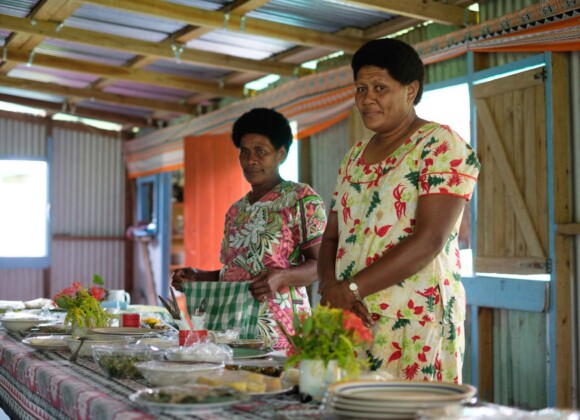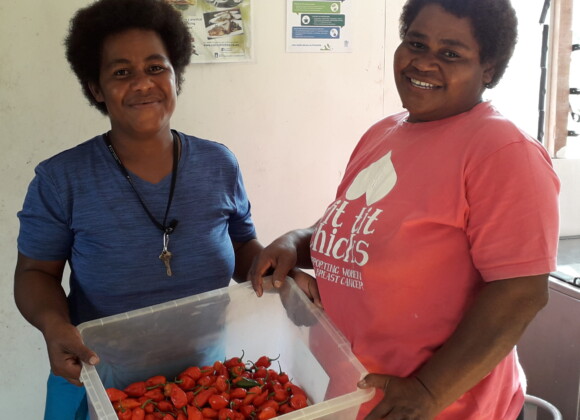Income diversification to help build community resilience
October 16, 2020
 By Neehal Khatri
By Neehal Khatri
One of the biggest financial lessons from the COVID-19 crisis is to diversify and not rely on a single source of income. This is a business concept that underpins the way in which Talanoa Treks has supported the development of hiking tourism with its community partners.
Talanoa Treks is a social enterprise that works in partnership with remote rural communities across Viti Levu to help them tap into tourism income and provide hiking and cultural experiences for guests. The communities they work with include Nabutautau, Navai, Naga and Nabalesere.
“It was important from the outset that tourism development happened on the communities’ terms – that they decided how often they wanted to host guests and how they wanted to organise their community enterprise,” shared Marita Manley, director of Talanoa Treks.
The tourism enterprise complements the communities’ income from agriculture and they took care to ensure that it did not replace agriculture as the main source of livelihood.
“We work hard to ensure that hiking guests understand that they are hosted by communities that have strong traditional governance structures and that village life is disrupted as little as possible while they are there,” Ms Manley said.
This is why when international tourism came to a grinding halt earlier this year as COVID-19 spread across the globe, these communities were able to cope despite the decrease in their tourism income.
“Women in the communities we work with are used to dealing with uncertainty. They have seen a decline in their agricultural income too and are going to the market less often to sell produce as a result,” she added.
 To help these communities diversify their revenue streams and boost their income, Talanoa Treks will work with them to identify alternative and market-appropriate livelihood opportunities. The COVID-19 recovery work carried out in Nabutautau and Naga, which consist of about 50 households, is supported by the Australian Government through the Australian Humanitarian Partnership and the Fiji Women’s Fund.
To help these communities diversify their revenue streams and boost their income, Talanoa Treks will work with them to identify alternative and market-appropriate livelihood opportunities. The COVID-19 recovery work carried out in Nabutautau and Naga, which consist of about 50 households, is supported by the Australian Government through the Australian Humanitarian Partnership and the Fiji Women’s Fund.
According to Ms Manley, one of the ways they would support the women who have lost tourism income is by helping them to produce value-added agricultural products such as cassava and taro chips and chutneys. She said they aimed to use and build upon existing structures, including the kitchens that were constructed during an earlier project supported by the Fiji Women’s Fund.
The Ministry of Agriculture, food processing specialist Richard Beyer, food safety specialist Api Cegumalua, and the Foundation for Rural Integrated Enterprises and Development (FRIEND) have all provided tourism-related training to these communities in the past and these skills will be further developed as part of this initiative. Ms Manley said they would also assist these communities by connecting them to markets in Suva, including domestic tourists and relevant enterprises, to help them to identify markets for food products and handicrafts.
Given the abundance of fresh fruits and vegetables available locally, supporting rural communities build upon and diversify their revenue streams and add value to agricultural products can support income generation within rural communities. As many Fijians who have lost their jobs in the tourism sector return to their communities, identifying new and innovative small-scale processing opportunities will become increasingly important.
About Talanoa Treks
Walks & Trails (Fiji) Limited trading as Talanoa Treks was registered in 2013, a social enterprise working in partnership with four rural communities across Viti Levu. Talanoa Treks partners with Nabalesere, Senituatua (Nubutuatua) and Vuevata (Naga) Women’s Clubs. Women in each community earn income from their community businesses for providing services such as hosting guest, providing meals, looking after accommodation and working as trekking guides.
To learn more about Talanoa Treks and their work with community partners, click here to visit their website.
Recent Whats New
WFF Visit to “Rise Beyond the Reef”
December 12 2023
LifeBread Confident Woman Program Graduation
December 12 2023
